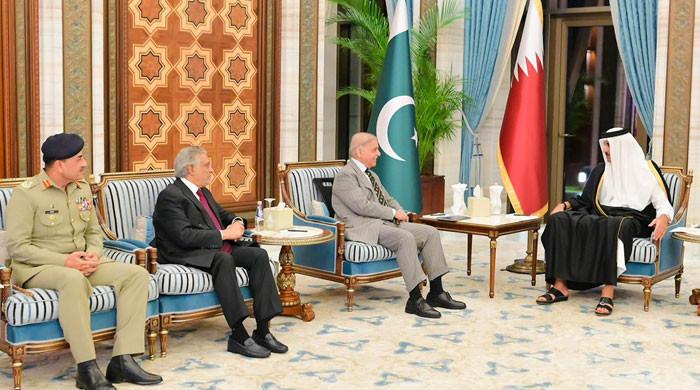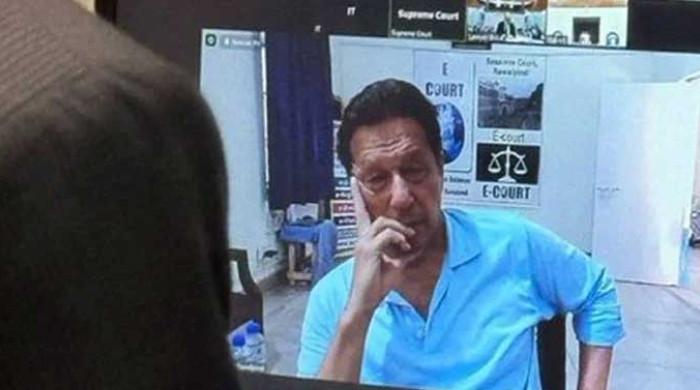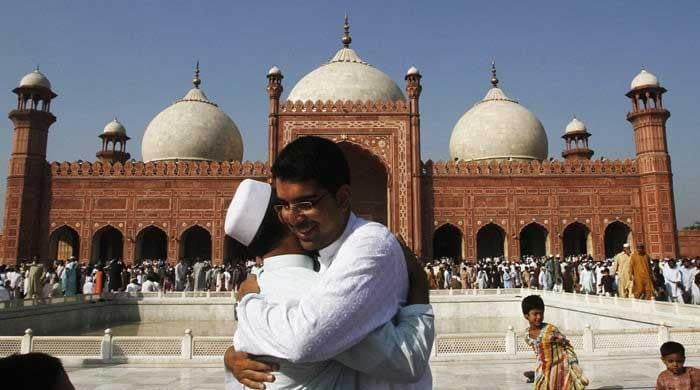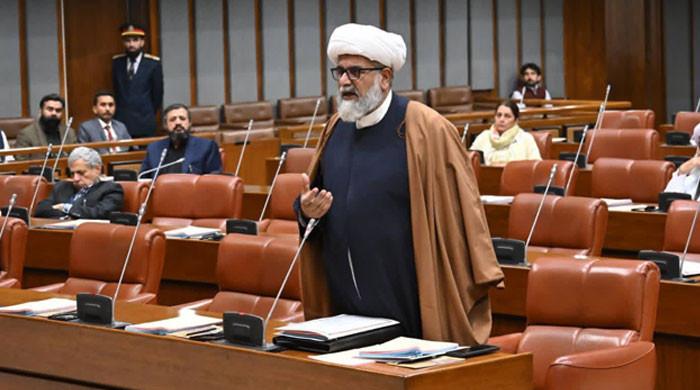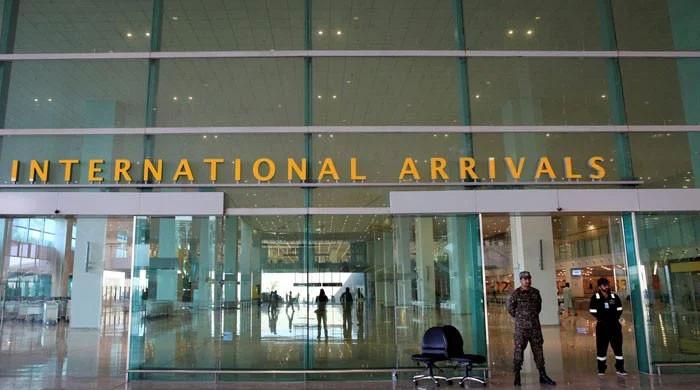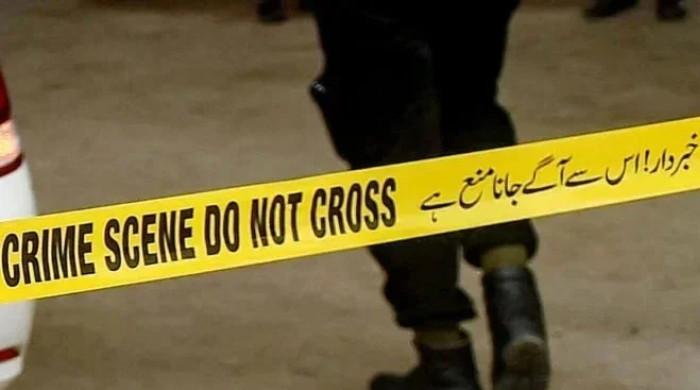PM Shehbaz hails US President Trump as 'man of peace' in rare White House meeting
Premier Shehbaz and Field Marshal Asim Munir hold warm and cordial engagement with Donald Trump at Oval Office
September 26, 2025
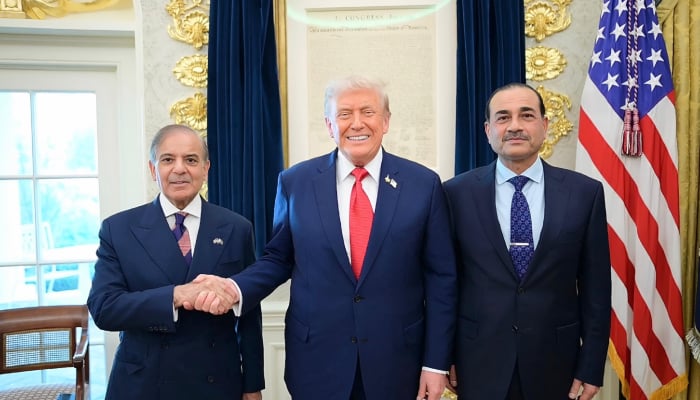
- Three leaders meet in warm and cordial environment.
- PM, Trump discuss trade, security, counterterrorism.
- Before meeting, Trump calls PM, COAS, "great" men.
Prime Minister Shehbaz Sharif on Thursday expressed his “deep admiration” for United States President Donald Trump, describing him as a “man of peace” engaged in sincere efforts to end conflicts around the world.
Speaking during a warm and cordial meeting with President Trump at the Oval Office, the prime minister said the US leader’s bold, courageous, and decisive actions had helped facilitate the ceasefire between Pakistan and India, thereby averting what he called a potential “major catastrophe” in South Asia, a statement issued by the Prime Minister's Office read.
While discussing the situation in the Middle East, the premier lauded President Trump's efforts to bring about an immediate end to the war in Gaza, especially his initiative to invite key leaders of the Muslim world in New York, earlier this week, for a comprehensive exchange of views for restoration of peace in the Middle East, in particular Gaza and the West Bank.
PM Shehbaz, who was flanked by COAS Asim Munir at the rare meeting, also thanked President Trump for the tariff arrangement that was concluded between Pakistan and the United States earlier this year.
While fondly recalling the longstanding partnership between the two countries, the PM expressed the confidence that under President Trump's leadership, the Pakistan-US partnership would be further strengthened to the mutual benefit of both countries.
In this regard, the premier invited the US Companies to invest in Pakistan's agriculture, IT, mines and minerals and energy sectors.
The two leaders also discussed regional security, including counter-terrorism cooperation. PM Shehbaz thanked President Trump for his public endorsement of Pakistan's role in counter-terrorism and stressed the need to further enhance cooperation in security and intelligence.
He also extended a warm and cordial invitation to President Trump to undertake an official visit to Pakistan, at his convenience.
Ahead of the meeting, which lasted for more than an hour, the US president, while speaking to the media, called PM Shehbaz and Field Marshal Munir "great" people.
In images released from the White House, PM Shehbaz, COAS Field Munir and President Trump were seen engaged in cordial discussions. During the meeting, US Secretary of State Marco Rubio and Vice President JD Vance were also present.
Reacting to the development, Defence Minister Khawaja Asif said 2025 had so far been a year full of achievements for Pakistan, highlighting victory over India, the signing of a defence agreement with Saudi Arabia, and unprecedented progress in Pakistan-US relations.
He added that the success of the "hybrid system" partnership continued to bear fruit, describing these developments as a matter of gratitude and pride.
US-Pakistan ties have warmed in recent months under Trump after Washington had for years viewed Pakistan's rival India as a counter to China's influence in Asia.
Democratic leader Shahid Khan, talking to Geo News, described the recent meeting as highly significant, saying it has lifted Pakistan-US relations to an entirely new level.
Reflecting on the talks between Pakistan’s top leadership and US president, Khan, who served as a member of the President’s Advisory Committee on the Arts during Joe Biden’s term, noted that Pakistan has not only cemented its importance in South East Asia but has also carved out a meaningful role in the Middle East.
He argued that Pakistan now holds a permanent seat at the table partly due to India’s miscalculations, as well as Islamabad’s firm stance on the Palestinian question and its balanced position on Iran.
These factors, he said, have earned Pakistan growing respect across the world, with both Western countries and the US leaning on it more than ever before.
Khan further stressed that Pakistan’s four-day war with India earlier this year demonstrated the nation’s considerable strength.
The conflict, he added, diminished India’s long-claimed status as the region’s “guardian of security,” while elevating Pakistan’s role as a decisive player in South East Asia’s strategic landscape.
Analyst Qamar Cheema, talking to Geo News, described the meeting as highly significant, noting that it reflected a shift in Pakistan-US relations from security-focused ties towards geo-economics.
He cited President Trump’s announcement of plans to send American companies to Pakistan to launch oil exploration projects.
Cheema called it a watershed moment, saying the US president was offering a boost to Pakistan’s economy.
Journalist Faiz Rehman, speaking to Geo News, noted that Pakistan not only shares a long border with Iran but also deep-rooted ties that span centuries — from culture and civilisation and cuisine to language and trade. These enduring links, he said, make Pakistan uniquely placed to engage its neighbour in sincere dialogue.
Rehman stressed that with Trump meeting in the backdrop, Pakistan’s outreach to Iranian leaders carries immense significance. In his words, these engagements are “bridges of trust” that could help stabilise a turbulent region.
He further observed that Trump is a businessman, and his warmth towards Pakistan is not without calculation. Rehman argued that the president sees in Pakistan a partner capable of delivering on multiple fronts, such as diplomacy, geopolitics, and defence.
US-Pakistan ties after India war
Washington's relations with New Delhi have been tested under the Republican leader over issues such as visa hurdles for Indians, high tariff rates imposed by Trump on goods from India, and Trump's repeated claims that he brokered an India-Pakistan ceasefire in May after the South Asian neighbours engaged in their latest hostilities.
India's attacks prompted Pakistan to launch Operation Bunyan-um-Marsoos after downing six Indian Air Force fighter jets, including three Rafales, in response to Indian unprovoked aggression.
The conflict eventually ended via a US-brokered ceasefire for which Pakistan has credited President Trump, while also nominating him for the Nobel Peace Prize.
Since then, Islamabad and Washington have been engaged with each other in high-level interactions between both civil and military leadership and have also finalised a much-hyped trade deal, reflecting improving relations between the two countries.
The United States and Pakistan announced a trade deal on July 31, with a 19% tariff rate imposed by Washington, while a trade deal with India is yet to be reached.
Officials and analysts have noted that after tensions with Washington, New Delhi is recalibrating relations with China as a hedge.
Trump welcomed Field Marshal Munir earlier this year, the first time a US president hosted the head of Pakistan's army at the White House, unaccompanied by senior Pakistani civilian officials.
"We're working through a number of issues when it comes to counter-terrorism, when it comes to economic and trade ties," a senior State Department official told reporters in a briefing on Tuesday when asked about Pakistan.
"And so the president remains focused on advancing US interests in the region, which includes engaging with Pakistan and their government leaders," the official said.




